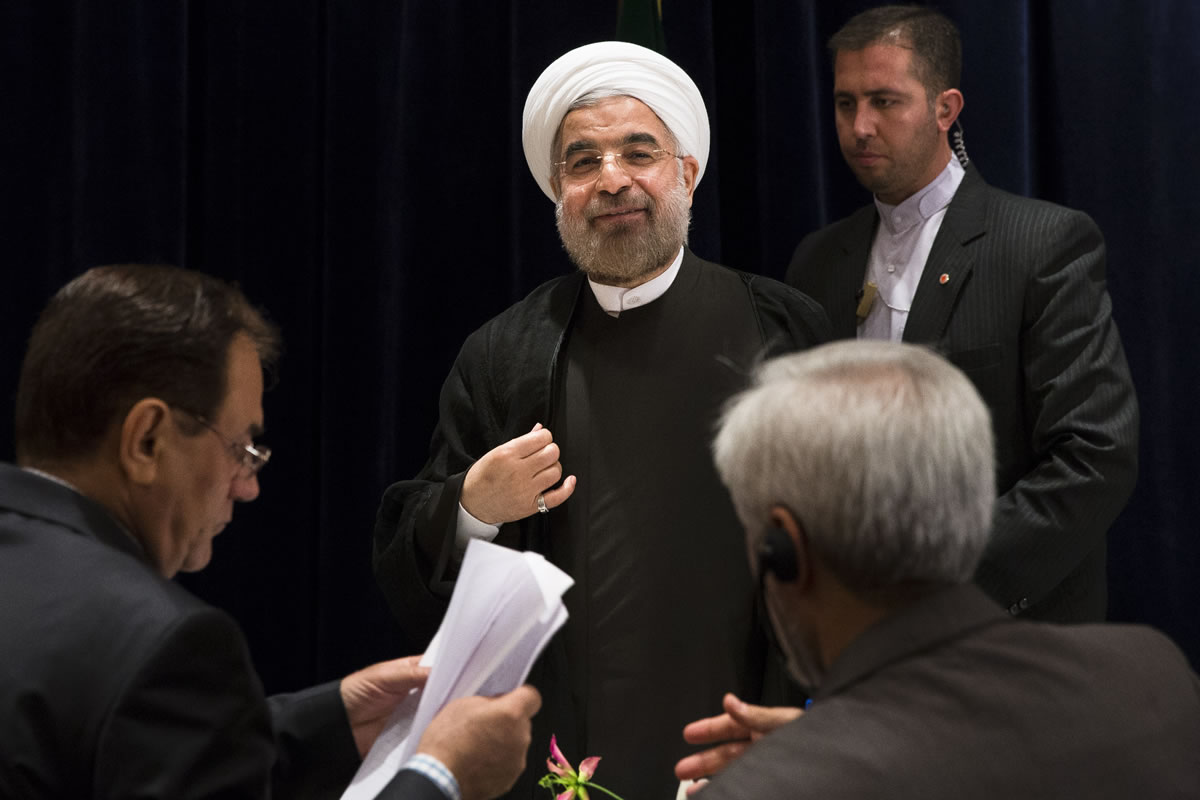WASHINGTON — The United States and Iran took a dramatic step toward ending more than three decades of estrangement on Friday when President Barack Obama phoned Iranian President Hassan Rouhani and they agreed to work toward resolving the deep dispute over global suspicions that Tehran is trying to build a nuclear weapon.
The last previous direct conversation between leaders of the two countries was in 1979 before the Iranian Revolution toppled the pro-U.S. shah and brought Islamic militants to power. Obama said the long break “underscores the deep mistrust between our countries, but it also indicates the prospect of moving beyond that difficult history.”
The phone call capped a week of seismic alterations in the relationship, revolving around Rouhani’s participation in the annual U.N. meeting of world leaders. The night before the two leaders spoke, U.S. and European diplomats had hailed a “very significant shift” in Iran’s attitude and tone in Thursday’s first talks on the nuclear standoff since April.
Rouhani, at a news conference earlier Friday in New York, linked the U.S. and Iran as “great nations,” a remarkable reversal from the anti-American rhetoric of his predecessors, and he expressed hope that at the very least the two governments could stop the escalation of tensions.
In fact, Rouhani reached out to arrange the 15-minute call with Obama. The White House said an encouraging meeting between Secretary of State John Kerry and Iranian Foreign Minister Mohammad Javad Zarif was a crucial factor.
Describing the call at the White House, Obama said, “While there will surely be important obstacles to moving forward, and success is by no means guaranteed, I believe we can reach a comprehensive solution.” Iran’s nuclear program has been a major concern not only to the United States but to other Middle Eastern nations — especially Israel — and to the world at large.
The new Iranian president has repeatedly stressed that he has “full authority” in his outreach to the U.S., a reference to the apparent backing by Iran’s ultimate decision-maker, Supreme Leader Ayatollah Ali Khamenei. Such support would give Rouhani a political mandate that could extend beyond the nuclear issue to possible broader efforts at ending the long estrangement between Tehran and Washington — and the West in general.
It remains unclear, however, whether obstacles will be raised by Iran’s hard-line forces such the powerful Revolutionary Guard, which had warned Rouhani about moving too fast with his overtures with the West.
Nonetheless, the phone call — Obama at his desk in the Oval Office, Rouhani in a limousine on the way to the airport after diplomatic meetings at the United Nations — marked one of the most hopeful steps toward reconciliation in decades.
“This is part of a pattern that has led to a real breakthrough,” said Iran scholar Gary Sick at Columbia University. “And basically what’s happening is that the ice that has covered the U.S.-Iran relationship for over the last 30 years is starting to break. And when ice starts to break up, it goes faster than you think. This is breathtaking.”
Obama entered the White House briefing room to announce the conversation about an hour after the call.
“I do believe that there is a basis for resolution,” Obama said. He said an agreement could usher in a new era of mutual interest and respect, but he said it would require Iran to take “meaningful, transparent and verifiable actions” in its nuclear program.
“A path to a meaningful agreement will be difficult. And at this point both sides have significant concerns that will have to be overcome,” Obama said. “But I believe we’ve got a responsibility to pursue diplomacy and that we have a unique opportunity to make progress with the new leadership in Tehran.”



